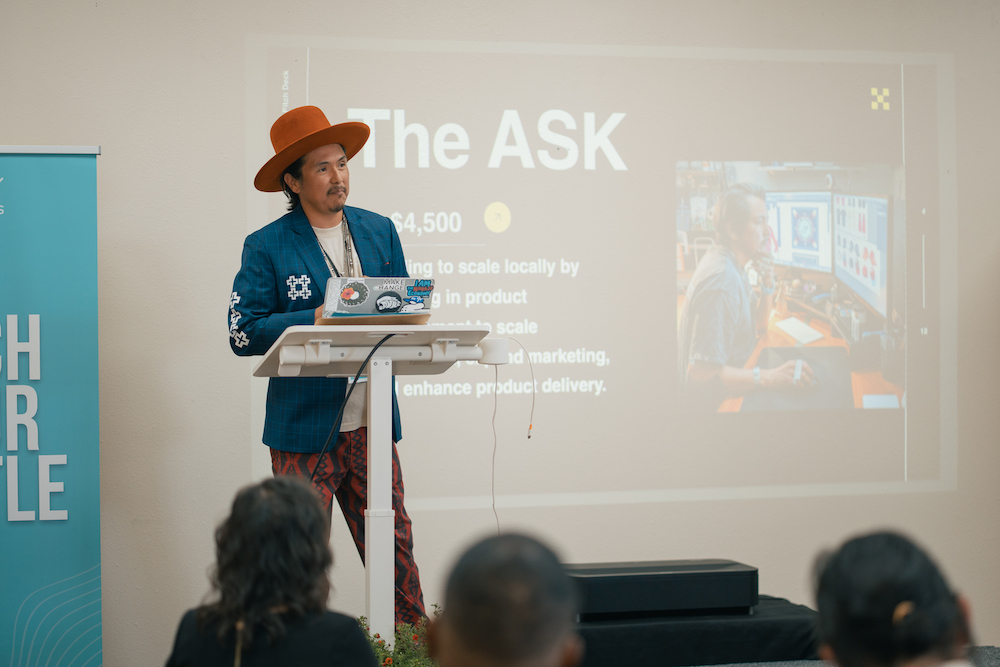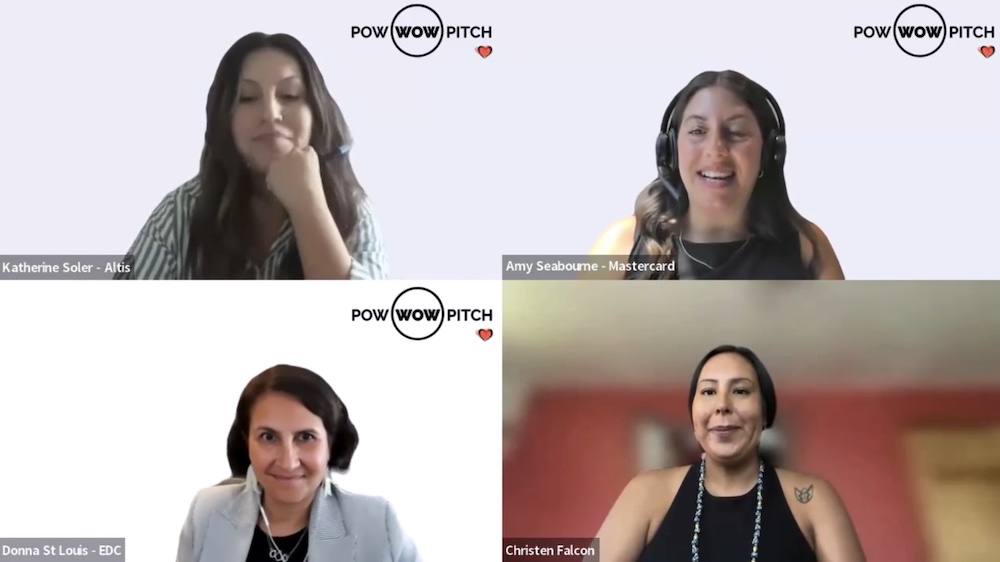
- Details
- By Chez Oxendine
- Indigenous Entrepreneurs
Success, for Christen Falcon, looks more like a problem: more customers than shuttles, more demand than her Blackfeet Nation-based ecotourism business can handle. Tourists eager to explore Glacier National Park through the lens of Blackfeet knowledge and stewardship are booking faster than her small fleet can accommodate. She needs $25,000 to add vans and drivers — modest expansion capital that’s often hardest to find in Indian Country.
Then she found Pow Wow Pitch.
In September, Falcon pitched her business, Backpacker’s Ferry, to judges in the tourism semi-final of the Indigenous-led pitch competition. She described how her tours connect Glacier National Park visitors to Blackfeet history, land stewardship, and climate resiliency — a model that channels tourism revenue back into her community. She won $1,000 and a spot in the grand finale, where she’ll compete for the $25,000 grand prize on Oct. 22.
The pitch contest is an opportunity to showcase their ideas, refine their business models and compete for funding that’s often hard to access in Indian Country.
"Often we don’t get the upbringing of learning financial literacy or how to start or run a business,” Falcon told Tribal Business News. “Being able to pitch in a space centered on Indigenous entrepreneurs gave us an opportunity we couldn’t find elsewhere.”
Pow Wow Pitch is one of multiple Native American-centered business pitch contests, in which aspiring business owners try to sell prospective investors and supporters on their business ideas. While formats vary, the process often combines mentorship, skill-building and public presentation — a fusion of storytelling and strategy — culminating in awards that range from hundreds to thousands of dollars.
 Christen Falcon (lower right) presents her business, Backpacker’s Ferry, during the virtual Pow Wow Pitch semi-finals. In her pitch, she described how the Blackfeet Nation-based shuttle service helps channel Glacier National Park tourism revenue back into her community while educating visitors about Blackfeet history, land stewardship and climate resiliency. (Photo: YouTube)
Christen Falcon (lower right) presents her business, Backpacker’s Ferry, during the virtual Pow Wow Pitch semi-finals. In her pitch, she described how the Blackfeet Nation-based shuttle service helps channel Glacier National Park tourism revenue back into her community while educating visitors about Blackfeet history, land stewardship and climate resiliency. (Photo: YouTube)
For Pow Wow Pitch, for example, competitions take place both at powwows — hence the name — as well as virtually. At the powwows, 20 to 30 entrepreneurs present to judges and audiences. Winners can receive up to $5,000 immediately. Virtual programming expands that reach, culminating in a grand finale with more than $100,000 in total prizes across the winning pitches.
Executive Director Naomi Sarazin said both the powwow competitions and the organization’s virtual offerings stand at an intersection of Indigenous cultural pillars: trade, storytelling, and sovereignty.
“Indigenous pitch competitions are important because they go beyond business. They are about community, storytelling and self-determination,” Sarazin said. “These spaces create opportunities for connection, mentorship, and growth, while celebrating the diversity and creativity of Indigenous entrepreneurs.”
Other Indigenous pitch events in the United States follow similar models. Change Labs' "Pitch Your Hustle" in Tuba City, Arizona, supports Navajo and Hopi entrepreneurs with workshops and networking alongside its contest. Applicants must be enrolled tribal members with at least 50% ownership in their business and submit a three-minute pitch video along with their application. The organization's next pitch event is scheduled for November 15, with pitch submissions due by October 31. Fourteen finalists — seven in a business category and seven in an artisan and creative-based category — will compete for a total of $40,000 in prizes, with first-place winners in each category taking home $6,000.
Others embed pitch competitions within larger conferences and programs. The American Indigenous Business Leaders organization hosts pitch events at its national conference, while Native Women Lead in New Mexico concludes its accelerator program with a pitch showcase. Regional events like the Wisconsin Indigenous Housing & Economic Development Corporation's second annual conference on Nov. 5-6 also include pitch competitions alongside programming for tribal enterprise executives and investors.
In Canada, events like the Manito Ahbee Festival’s pitch competition in Winnipeg and the Kamloopa Powwow pitch competition in British Columbia feed winners into Pow Wow Pitch’s grand finale. Other programs, such as the SOAR Indigenous Entrepreneurship Competition in Saskatchewan, combine training with a final pitch event to secure the prize.
Across these programs, the structure is consistent: mentorship, preparation, public presentation and judging. Organizers say the mix helps entrepreneurs refine their vision, gain visibility and build networks for long-term growth.
Beyond prize money, Pow Wow Pitch Communications Director Keely Thompson-Cook said Indigenous pitch events are built around “a culture of community and love and respect and fun.” She noted that many participants overcome public speaking fears and leave with new skills and connections.
All of that creates tangible results. Thompson-Cook cited examples of entrepreneurs hiring more Indigenous employees, opening storefronts, expanding partnerships and purchasing new equipment. Shyra Barberstock, for example, was the winner of the 2024 grand prize for Pow Wow Pitch. Barberstock took home $25,000 for her Ontario-based tea and coffee business Kebaonish.
The money allowed her to hire a marketing team, expanding the brand's presence on social media. That not only led to more sales, but partnerships, such as an ongoing deal with distributor Proudly Indigenous.
Barberstock attributed part of her win to preparation and experience. She had pitched twice before with other ventures before winning with Kebaonish, and said mentorship from Pow Wow Pitch coaches and practice in earlier rounds helped refine her delivery.
“When we won Pow Wow Pitch, it was overwhelming — but in a good way,” Barberstock said. “It has significantly contributed to my growth.”
This year, she’ll serve as a judge at the Pow Wow Pitch grand finals, hoping to offer the same mentorship she once received. She said she’ll be looking for concise pitches that clearly show how the money could be transformational.
“I want to know if winning will make a huge difference for them,” Barberstock said. “Is this a business that’s just on the verge of growing, and if they won, would it help bring them to the next level?”
In Michigan, tech incubator and accelerator 20Fathoms has launched its own competition called IndigiPitch to provide a similar platform. CFO and tribal liaison Shiloh Slomsky said the incubator already runs quarterly pitch competitions through a program called TC New Tech, but IndigiPitch was created to ensure Native-owned businesses had equal access.
Slomsky said Indigenous programming at 20Fathoms is designed differently than non-tribal offerings, with classes taught by Indigenous subject matter experts and curriculum rooted in culture, community and tradition.
"[Indigenous entrepreneurs] tend to look at things differently - it's not just about building wealth, but considering what kind of impact you're making, considering Mother Earth, thinking about those next seven generations," Slomsky said. "With Indigipitch, I wanted us to have the stage and the opportunity to look through that lens, because I don't think it's really seen or acknowledged enough."
The inaugural IndigiPitch, scheduled for Dec. 5 at Odawa Casino, will feature Native-owned businesses from across the state, with all judges and the event MC drawn from Indigenous communities. For Slomsky, it's not strictly about who wins. For her, the success will be just getting people up there to pitch.
“I think a successful pitch is an entrepreneur who is brave enough to share their business,” Slomsky said. “To me it’s about highlighting the diversity and strength, not necessarily looking for the next unicorn.”
Falcon agrees. For Native entrepreneurs across the U.S. and Canada, she said the best way to succeed is simple: step up, be yourself and pitch.
"Being in a space that is centered like this gave us more of an opportunity to go for funding in such an authentic way," Falcon said. "I would say, if you're considering it, you should definitely go out and do it."
Brian Edwards contributed reporting.
